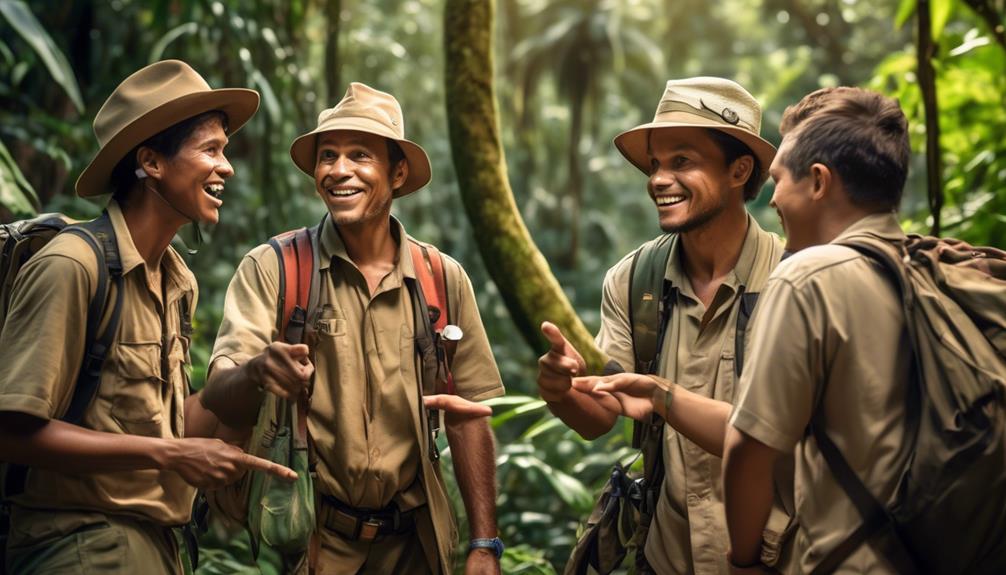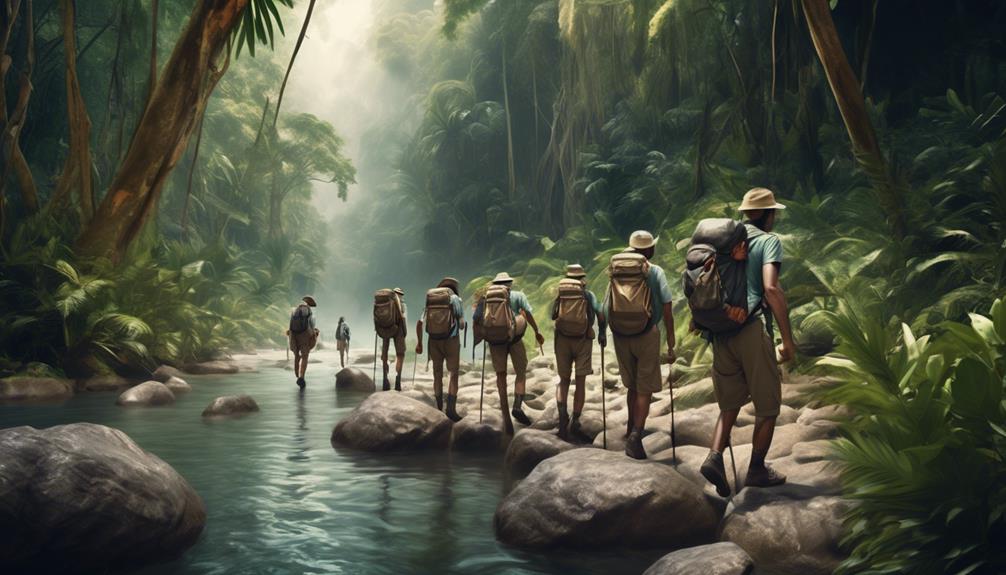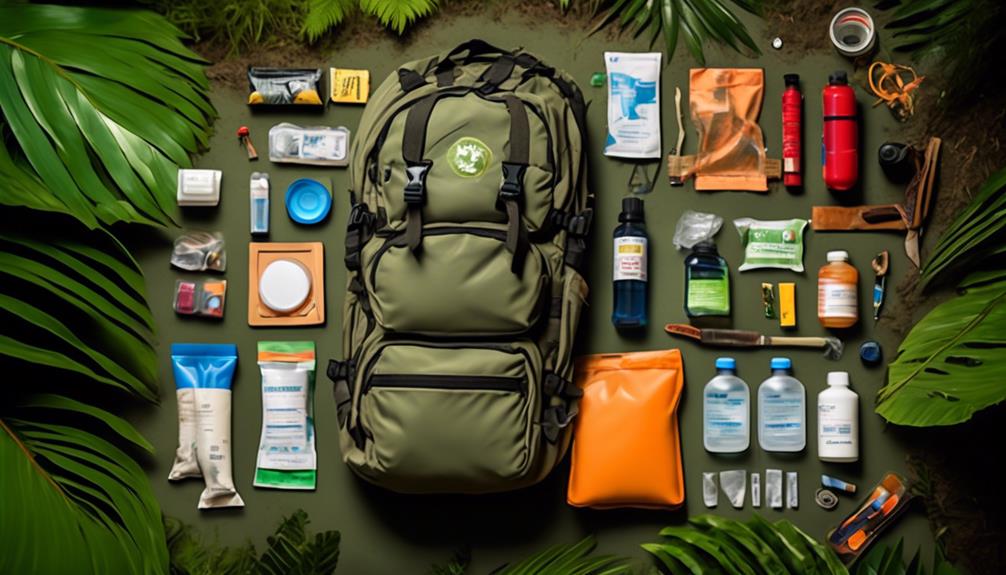Five Essential Tips for Jungle Expeditions With Natives
As you tread through the thick underbrush, the vibrant calls of exotic birds and the distant rustle of unseen creatures surround you, creating a symphony of nature.
Venturing into the jungle with native guides can be an enriching and insightful experience, but it also requires careful preparation and understanding.
Whether you're an avid adventurer or a first-time explorer, these five essential tips will help you navigate the complexities of the jungle, forge meaningful connections with the local communities, and ensure a safe and rewarding expedition.
Choosing the Right Native Guide

When selecting a native guide for your jungle expedition, prioritize experience and knowledge of the local terrain. Language barriers and cultural differences can make communication and understanding challenging, so having a guide who speaks your language or can bridge the gap is crucial. Building trust and forming relationships with the native guide is essential for a successful jungle expedition.
To navigate through the dense jungle, you need a guide who not only knows the land but also understands the local customs and traditions. This knowledge can help in navigating delicate situations and avoiding unintentional offense. It's important to find a guide who can help bridge the gap between your culture and theirs, ensuring smooth communication and mutual respect.
As you embark on your jungle adventure, the ability to communicate effectively with your guide is paramount. A guide who understands your language can help you navigate the terrain, avoid potential dangers, and make the most of your experience. Conversely, if there are language barriers, it can lead to misunderstandings and potentially hazardous situations. Therefore, prioritizing a guide who can effectively communicate with you is key.
Building trust and forming a strong relationship with your guide is crucial for a successful expedition. This won't only enhance your overall experience but also ensure that you can rely on your guide in challenging situations. By prioritizing experience, local knowledge, effective communication, and relationship building, you can secure the right native guide for your jungle expedition.
Understanding Local Wildlife and Plants
Exploring the jungle requires a deep understanding of the local wildlife and plants to ensure your safety and enrich your expedition experience. The following tips will help you navigate the jungle terrain and make the most of your encounter with the diverse flora and fauna:
- Identifying Dangerous Species: Learning to recognize and avoid dangerous animals and plants is crucial. Natives can provide valuable insights into the behavior and appearance of venomous snakes, spiders, and plants like poison ivy or poison oak. Understanding the warning signs and taking necessary precautions can prevent potentially harmful encounters.
- Medicinal Plants and Herbs: Familiarize yourself with the various medicinal plants and herbs found in the jungle. Natives have extensive knowledge of natural remedies derived from plants, which can be invaluable in treating minor injuries or illnesses during your expedition. Building your awareness of these natural resources can enhance your appreciation for the jungle's biodiversity and may prove beneficial in emergency situations.
- Respecting Wildlife: Observing wildlife from a safe distance is essential for both your safety and the well-being of the animals. Natives can educate you on the behaviors and habitats of different species, allowing you to appreciate the jungle's inhabitants without disturbing their natural environment.
- Understanding Plant Life: Gain knowledge of the diverse plant life in the jungle, including edible fruits, nuts, and other useful vegetation. Natives can teach you how to identify edible plants and the best practices for foraging sustainably.
Navigating the Terrain Safely

To navigate the jungle terrain safely, it's essential to familiarize yourself with the native trails and seek guidance from experienced locals. Jungle navigation and survival require a deep understanding of the terrain challenges and the necessary safety precautions to ensure a successful expedition.
First and foremost, gaining knowledge of the native trails is crucial. Locals have an innate understanding of the jungle terrain, including the safest paths to take and the potential hazards to avoid. By learning from their experience, you can navigate the jungle more effectively and minimize the risks associated with unfamiliar territory.
Additionally, it's important to be well-prepared for the terrain challenges that may arise. Uneven ground, dense vegetation, and unexpected obstacles can make navigation difficult. Wearing appropriate footwear with good grip, carrying essential gear such as a machete, and maintaining situational awareness are all vital for safe passage through the jungle.
Furthermore, taking safety precautions is non-negotiable. Always inform someone of your intended route and expected return time. Pack essential supplies such as a first aid kit, sufficient water, and high-energy snacks. It's also wise to carry a compass or GPS device to help maintain your bearings.
Embracing Native Culture and Customs
- Immerse yourself in the rich tapestry of native culture and customs to gain a deep appreciation for the traditions and values of the jungle communities.
- Cultural immersion is essential for truly connecting with the native communities during your jungle expedition.
- By participating in traditional ceremonies, you can gain insight into the spiritual and cultural significance of these rituals.
- This experience won't only enrich your understanding of the native culture but also foster a sense of mutual respect and understanding between you and the indigenous people.
Language learning is another crucial aspect of embracing native culture.
- Taking the time to learn some basic phrases in the local language can go a long way in showing respect for the community.
- It can also facilitate better communication and interaction with the locals, leading to more meaningful experiences.
- Additionally, familiarizing yourself with cultural etiquette is important to avoid unintentionally causing offense.
- Understanding the do's and don'ts within the community will help you navigate social interactions with sensitivity and respect.
- Engage in cultural immersion through participation in traditional ceremonies.
- Learn the local language to foster better communication and understanding.
- Respect cultural etiquette to ensure harmonious interactions with the native community.
- Embrace the opportunity to gain insight into the values and beliefs of the native culture.
Packing Essential Supplies and Gear

As you prepare for your jungle expedition, ensuring that you pack essential supplies and gear is vital for embracing native culture and customs and fully immersing yourself in the experience. When venturing into the jungle with natives, it's crucial to prioritize emergency medical supplies and survival techniques to ensure your safety and well-being.
First and foremost, pack a well-stocked first aid kit that includes essentials such as bandages, antiseptic wipes, pain relievers, and any personal medications you may need. Additionally, consider including items like a tourniquet, a snakebite kit, and diarrhea medication to address common jungle-related health concerns.
In terms of survival techniques, don't forget to pack a reliable multi-tool, waterproof matches, and a portable water filtration system to ensure a safe and sustainable water supply. It's also advisable to bring along a compact, durable tent or hammock, as well as a lightweight sleeping bag suitable for the jungle environment.
Moreover, packing high-energy, non-perishable snacks like nuts, dried fruits, and energy bars can provide essential sustenance during long treks or unexpected delays. Lastly, a reliable communication device such as a satellite phone or emergency locator beacon can be a crucial lifeline in the event of an emergency.
Communicating Effectively With Natives
When interacting with natives during your jungle expedition, it's essential to establish clear and respectful communication to foster understanding and mutual cooperation. This involves not only learning their language but also understanding and respecting their cultural etiquette. Here are some essential tips to help you communicate effectively with natives:
- Learn the Language: Take the time to learn some basic phrases in the native language. This effort demonstrates respect for their culture and can go a long way in building rapport with the locals.
- Observe Cultural Etiquette: Familiarize yourself with the cultural norms and practices of the native community. Understanding their customs and traditions will show your respect for their way of life.
- Use Nonverbal Communication: In addition to words, nonverbal cues such as gestures and body language can bridge communication gaps. Be mindful of your nonverbal communication to avoid misunderstandings.
- Seek Clarification: If there are language barriers, don't hesitate to ask for clarification. Natives will appreciate your efforts to understand them, and it can lead to smoother interactions.
Respecting the Environment and Wildlife

To ensure a harmonious and sustainable jungle expedition, it's imperative to show the same level of respect and understanding to the environment and wildlife as you do to the native communities you encounter. When venturing into the jungle, minimizing your impact on the environment should be a top priority. Always follow designated trails to avoid trampling on sensitive vegetation, and refrain from removing or damaging any plants or trees. Additionally, be mindful of waste and pack out all of your garbage to keep the jungle pristine and free of pollution.
Wildlife conservation is another crucial aspect of respecting the environment during your expedition. Avoid disturbing or feeding wild animals, as this can disrupt their natural behaviors and even pose risks to their health. Keep a respectful distance and observe animals in their natural habitat without interfering. It's important to remember that we're visitors in their home, and we must act responsibly to ensure their well-being and survival.
Furthermore, refrain from using single-use plastics and opt for eco-friendly alternatives. Minimize your use of non-biodegradable materials to reduce the long-term impact on the environment. By being conscientious of your actions and making sustainable choices, you can contribute to the preservation of the jungle and its diverse wildlife.
Handling Emergency Situations
In case of emergencies during your jungle expedition, staying calm and following prepared safety protocols is essential for ensuring the well-being of yourself and others. Being equipped with first aid knowledge and emergency response skills is crucial for handling unexpected situations in the jungle. Here are some essential tips to help you navigate emergency situations:
- First Aid Training: Familiarize yourself with basic first aid techniques such as treating wounds, CPR, and handling allergic reactions. This knowledge can be invaluable in providing immediate assistance to anyone in need.
- Emergency Response Plan: Establish a clear emergency response plan with your expedition team. Designate roles and responsibilities for different scenarios to ensure a coordinated and effective response in case of emergencies.
- Survival Skills: Learn essential survival skills such as building shelter, finding sources of potable water, and starting a fire. These skills can be lifesaving if you find yourself in a situation where you need to survive in the jungle for an extended period.
- Communication Techniques: Practice effective communication techniques, including signaling for help and using communication devices such as radios or satellite phones. Clear and efficient communication can significantly aid in seeking assistance or coordinating rescue efforts.
Frequently Asked Questions
Are There Any Specific Customs or Traditions That I Should Be Aware of When Interacting With the Native Guides?
When interacting with native guides, be mindful of cultural etiquette and local taboos. Communication barriers may exist, so remain open and respectful. Embrace indigenous traditions and ask for guidance when unsure.
What Are Some Lesser-Known Plants or Animals That I Should Be Cautious of During the Expedition?
Watch out for poisonous plants and dangerous animals in the jungle. It's crucial to know native remedies for survival. Some lesser-known threats include the Manchineel tree, bullet ants, and the poison dart frog. Stay cautious and informed.
How Can I Best Prepare for Unexpected Changes in Terrain or Weather Conditions During the Expedition?
To best prepare for unexpected changes in terrain or weather conditions during the expedition, you should brush up on survival skills and pack emergency gear. Learn adaptation strategies and study weather forecasting to stay ahead of any challenges.
Are There Any Unique Cultural Experiences or Ceremonies That I Should Be Open to Participating in While on the Expedition?
Be open to cultural immersion and traditional practices during the expedition. Embrace indigenous ceremonies and local customs as unique experiences. Participating in these activities will deepen your understanding of the native culture and make your expedition more enriching.
What Are Some Non-Traditional Items or Supplies That Locals Recommend Bringing on the Expedition for Added Comfort or Safety?
To enhance your comfort and safety on the expedition, consider local recommendations for non-traditional items like insect repellent, quick-dry clothing, water purification tablets, and a lightweight hammock. These jungle supplies can make a big difference.
Conclusion
In conclusion, when embarking on a jungle expedition with natives, it's crucial to prioritize safety, respect, and cultural understanding.
By choosing the right guide, understanding the local environment, embracing native customs, packing essential supplies, and communicating effectively, you can ensure a successful and enriching experience.
Remember to always respect the environment and wildlife, and be prepared to handle emergency situations.
With these essential tips in mind, you'll be ready for an unforgettable jungle adventure with native guides.
